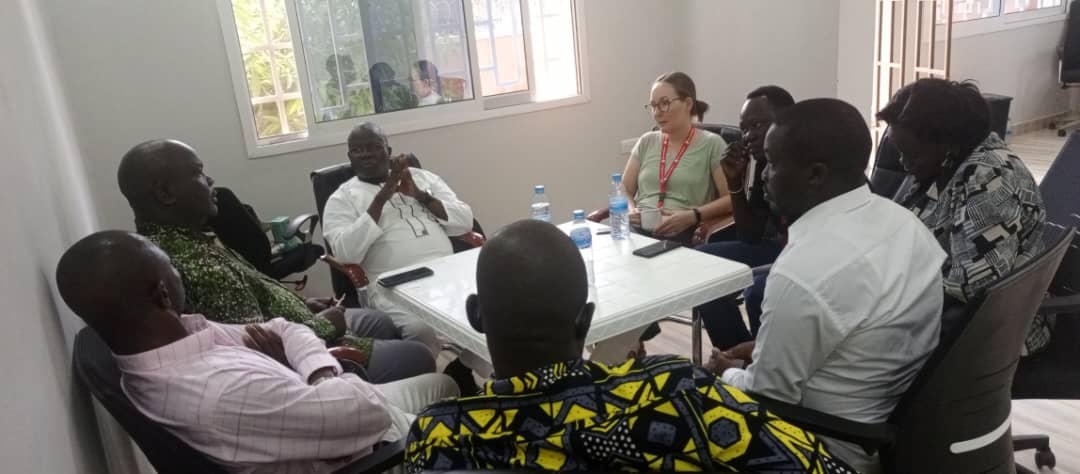
Juliana meeting with members of the LRPF secretariat in Juba in September 2023.
Striking a Balance on Localization
by Juliana Steele, Senior Director, Strategic Foundation Partnerships
I’ve been grappling with how NGOs should shift power to local organizations, advance localization, and contribute value within local contexts, so I did what any rational person would do and traveled to South Sudan to find out.
If you’re new to the localization conversation, localization is the process through which humanitarian actors work to ensure local and national actors are better engaged in the planning, delivery, and accountability of humanitarian action, while still ensuring humanitarian needs can be met swiftly, effectively, and in a principled manner. As a partnerships person who has never worked on the program side of international development, localization is new to me, too. But I have become a champion as I have realized that localization is at the global intersection of social justice, racial equity, and power redistribution.
Earlier this fall, I traveled to South Sudan for two weeks to observe 91≤÷Ņ‚‚Äôs localization efforts, which I had only read about. I visited Juba and Maban County in the Upper Nile State, meeting local partners, attending a capacity strengthening workshop, and hearing from children, parents, and educators working to protect their schools from the relentlessness of climate change.
Here are some of my main take aways from the many conversations had during my trip:
Done well, INGOs can be connective tissue in fragile environments. Before visiting Maban County in the Upper Nile State, I had a binary understanding of who would be present in this region: refugees and the host community. The fact is, Maban‚ÄĒas well as the rest of South Sudan‚ÄĒis made up of different languages, cultures, political ideologies, and refugee statuses, which affects how communities can deliver programs. Neutrality is key to this space where INGOs can serve a crucial role in the delivery of programming.
INGOs can maintain the visibility of a crisis. The war in Ukraine came up in many conversations, which has worsened hunger and increased poverty in East Africa, the continent and beyond. Not only has there been a reduction in grain exports to this part of the world, which has driven scarcity and inflation, but the war in Ukraine has also usurped media attention, financial support, and philanthropic energy. We talk about ‚Äúdonor fatigue‚ÄĚ frequently within the US donor market, but I heard the term again and again from colleagues and local leaders who are feeling the direct result. Recent headlines reinforce this issue as coverage of the South Sudan response becomes less frequent and prominent. As an INGO, 91≤÷Ņ‚ has a responsibility to keep the spotlight on protracted crises to ensure communities receive the support they so desperately need.
INGOs can support localization without setting or controlling the agenda. While in Juba, I met with the dedicated team at the Local Response Pooled Fund (LRFP), a grantmaking fund for South Sudanese organizations founded by local humanitarian leaders and funded by the Center for Disaster Philanthropy. I learned from the LRPF staff and several grantees about how they are meeting a need for more accessible funds, while also bolstering South Sudan‚Äôs burgeoning network of local and national organizations. In South Sudan, mass market and private donors don‚Äôt exist‚ÄĒthey must tap into multilateral or other humanitarian funding coming from outside of the country. 91≤÷Ņ‚ supports the LRPF by playing a technical and financial role as a fund custodian and a non-voting member of the steering committee to ensure funding is dealt equitably and sustainably.
INGOs can champion and support ‚Äúlocalization within localization.‚ÄĚ While meeting with the secretariat of the LRPF, I heard the term ‚Äúlocalization within localization‚ÄĚ as a way of characterizing equitable support for organizations that are more remote and less connected to the capital-city. Supporting organizations in Jonglei and the Upper Nile States should be as much of a priority as Juba and the Equitorial States. INGOs can connect and invite participation from organizations from throughout South Sudan, linking them to opportunities and networks in Juba and beyond.
Ultimately, localization is about investing in community leadership, local expertise, and self-determination. South Sudan faces difficult challenges, but I saw many bright spots and a great deal of hope for the new country when meeting with these organizations.
To read more about the LRPF, you can read our blog . For more information about our localization work, visit our website or email us at [email protected].
***
Special thanks to the LRPF, and for meeting with me while I was in Juba. Both organizations were eager to share their perspectives on working with 91≤÷Ņ‚ to fine tune their organizational strengths and identify their growth areas. Their time was greatly appreciated!
